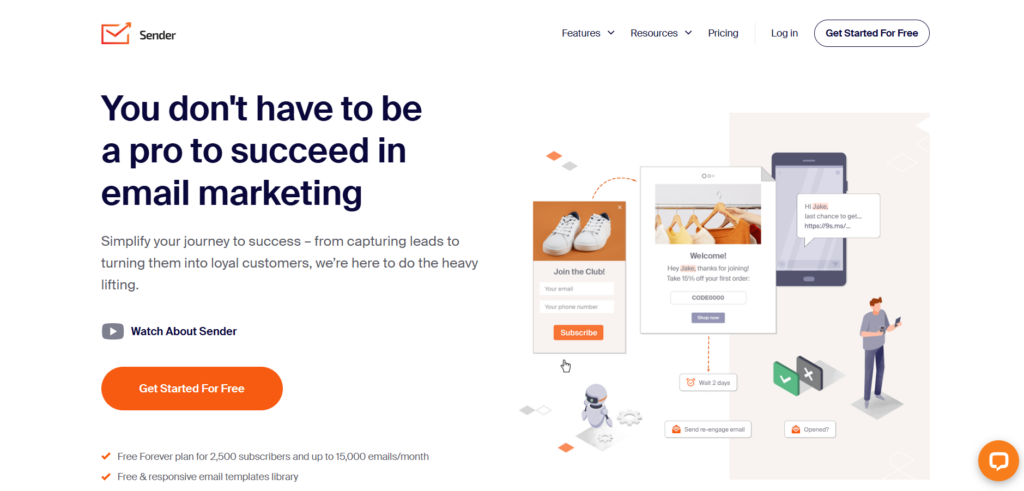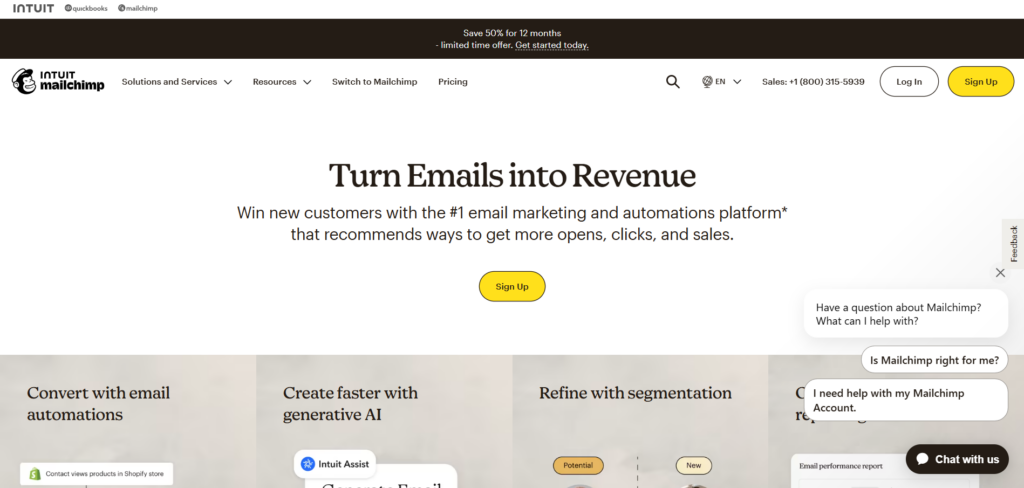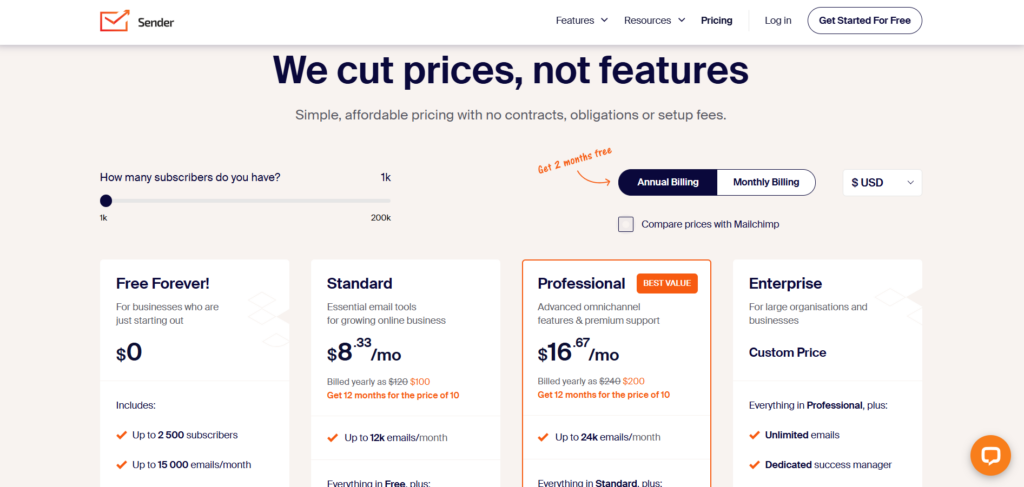Choosing between Sender and Mailchimp can be tricky, but it really depends on your needs. If you’re just starting out with email marketing or running a small business, Sender is a fantastic choice.
It’s simple to use, cost-effective, and offers solid features without overwhelming you. Plus, it’s great for basic email campaigns and automation.
On the other hand, if you’re looking for a platform with more advanced features like detailed analytics, sophisticated automation, and extensive integrations, Mailchimp might be the better fit. It’s designed for businesses that need a bit more complexity and scalability as they grow.
So, which is right for you? If you’re new to email marketing or on a budget, go with Sender. But if you’re ready to dive into more robust features and can invest in your email strategy, Mailchimp could be your best bet. Let’s dive into the details to help you decide!
What is Sender?
Sender is an email marketing platform designed to help businesses create and send engaging email campaigns with ease.

It offers a user-friendly interface, customizable templates, and tools for managing subscribers, automation, and analytics.
Sender is known for its affordability and robust features like drag-and-drop email editing, A/B testing, and integration with popular e-commerce platforms. It provides advanced segmentation and real-time reporting to optimize campaigns.
Ideal for beginners and professionals, Sender enables effective communication and audience growth without technical expertise.
[button-red url=”https://digitalmarketerr.com/recommends/sender/” target=”_blank” position=”center”]🔥Try Sender Now[/button-red]
What is Mailchimp?
Mailchimp is a marketing automation platform founded in 2001 that enables businesses to manage email marketing campaigns, automate communications, and analyze customer interactions.

It offers tools for creating and sending newsletters, building landing pages, and integrating with various e-commerce platforms.
Mailchimp’s user-friendly interface and robust features make it a popular choice for businesses aiming to enhance their marketing efforts and engage effectively with their audience.
[button-red url=”https://mailchimp.com/” target=”_blank” position=”center”]🔥Try Mailchimp Now[/button-red]
Features Comparison: Sender vs Mailchimp
When comparing Sender and Mailchimp, two prominent email marketing platforms, it’s essential to evaluate their features, pricing, and suitability for different business needs.
1. User Interface and Ease of Use
- Mailchimp: Offers a user-friendly, drag-and-drop email builder with a wide range of templates, making it accessible even to those new to email marketing.
- Sender: Provides a clean and efficient interface focused on essential features, allowing users to quickly set up campaigns without being overwhelmed by too many options.
2. Email Design and Customization
- Mailchimp: Provides extensive customization options with a vast selection of templates and a drag-and-drop editor, catering to users with varying levels of design expertise.
- Sender: Offers a streamlined email editor with a selection of templates focused on performance, suitable for users seeking simplicity and efficiency.
3. Automation and Segmentation
- Mailchimp: Features advanced automation capabilities, including customer journey builders, behavioral targeting, and multivariate testing, ideal for businesses with complex marketing strategies.
- Sender: Provides essential automation tools such as autoresponders and segmentation, sufficient for small to medium-sized businesses aiming to automate basic marketing tasks.
4. Integrations
- Mailchimp: Supports integrations with over 300 apps, including e-commerce platforms, CRM systems, and social media channels, offering extensive connectivity options.
- Sender: Integrates with various platforms, including popular e-commerce systems, and offers Zapier integration to connect with numerous other applications.
5. Reporting and Analytics
- Mailchimp: Delivers comprehensive analytics, including campaign reports, audience insights, and predictive demographics, aiding in data-driven decision-making.
- Sender: Offers essential reporting features, such as open rates and click-through rates, providing fundamental insights into campaign performance.
Verdict:
Mailchimp is well-suited for businesses seeking a comprehensive marketing platform with advanced features and extensive integrations, though it comes at a higher cost.
Sender is an excellent choice for small to medium-sized businesses or individuals looking for an affordable, straightforward email marketing solution with essential features.
Pricing and Affordability: Sender vs Mailchimp
In the world of email marketing, your budget plays a crucial role in determining the right tool. Let’s compare Mailchimp and Sender on their pricing structures and overall affordability.
Sender
Sender offers a range of pricing plans to accommodate various business needs:

1. Free Forever Plan:
- Subscribers: Up to 2,500
- Emails per Month: Up to 15,000
- Features: Access to all features, including email automation, with Sender branding on emails.
2. Standard Plan:
- Subscribers: Scales with your needs
- Emails per Month: Up to 30,000
- Features: Includes all Free plan features, plus SMS and MMS messaging, multi-user access, and removal of Sender branding.
- Pricing: Starts at $8.33 per month when billed annually.
3. Professional Plan:
- Subscribers: Scales with your needs
- Emails per Month: Up to 60,000
- Features: Includes all Standard plan features, plus free SMS & MMS credits, animated countdown timers, advanced automation, and a dedicated IP address.
- Pricing: Starts at $16.67 per month when billed annually.
4. Enterprise Plan:
- Subscribers and Emails: Customized for large organizations
- Features: Includes all Professional plan features, plus unlimited emails, a dedicated success manager, advanced user permissions, service level agreement, activity logs for auditing, SSO (SAML v2), and phone support.
- Pricing: Custom pricing; contact Sender for details.
5. Pay As You Go:
- Email Credits: Purchase as needed
- Features: Ideal for occasional senders; includes all Standard plan features.
- Pricing: Starts at $29 for 5,000 email credits.
For the most accurate and up-to-date pricing information, please visit Sender’s official pricing page.
[button-red url=”https://digitalmarketerr.com/recommends/sender/” target=”_blank” position=”center”]🔥Try Sender Now[/button-red]
Affordable and Straightforward Pricing
Sender positions itself as an affordable alternative in the email marketing space. It offers a free plan, much like Mailchimp, but its paid plans are generally more budget-friendly.
This makes Sender an attractive option for small to medium-sized businesses or anyone working with a tight budget.
Sender’s pricing is straightforward, with plans based on the number of subscribers and emails sent per month.
This clarity in pricing ensures that businesses can easily predict their email marketing costs without worrying about unexpected charges.
Mailchimp

1. Free Plan:
Available with basic features, suitable for up to 2,000 contacts and 10,000 sends per month with a daily limit of 2,000.
2. Essentials Plan:
Starting at around $9.99/month, this plan includes all email templates, A/B testing, custom branding, and support for up to 50,000 contacts.
3. Standard Plan:
Starting at approximately $14.99/month, this offers additional features like retargeting ads, advanced insights, and automation tools, catering to up to 100,000 contacts.
4. Premium Plan:
Starting from $299/month, aimed at larger businesses, offering advanced segmentation, multivariate testing, and unlimited seats and role-based access.
[button-red url=”https://mailchimp.com/” target=”_blank” position=”center”]🔥Try Mailchimp Now[/button-red]
Flexible Pricing for Different Needs
Mailchimp offers a tiered pricing model, which includes a free plan with basic features and several paid options that provide more advanced functionalities.
The free plan is a great starting point for small businesses or startups, but as your needs grow, you might find yourself looking at their Standard or Premium plans.
The advantage of Mailchimp’s pricing structure is its flexibility. You can choose a plan that fits your current needs and scale up as your business grows.
However, it’s important to note that as your subscriber list increases, so does the cost. For businesses with a large number of contacts, Mailchimp can become quite pricey.
The Final Verdict
Sender stands out as the better choice for many small businesses and startups due to its affordability and simplicity. While Mailchimp offers advanced features, it can be costly for smaller users, especially as your subscriber list grows.
Sender provides a robust free plan (up to 2,500 subscribers and 15,000 emails/month), with an intuitive drag-and-drop builder, automation, and segmentation at a fraction of the cost.
For businesses looking for a cost-effective, user-friendly solution without the complexity of Mailchimp, Sender is the best option.
[button-red url=”https://digitalmarketerr.com/recommends/sender/” target=”_blank” position=”center”]🔥Try Sender Now[/button-red]
FAQ’s
Which platform is more affordable?
- Sender: Offers free plans with up to 2,500 subscribers and 15,000 emails per month. Paid plans start at $11/month.
- Mailchimp: Free plan supports up to 500 contacts and 1,000 emails per month. Paid plans start at $13/month.
Which platform is better for beginners?
- Sender: Simplified tools and a user-friendly interface make it ideal for beginners.
- Mailchimp: Also beginner-friendly but offers more features that may feel overwhelming initially.
Does Mailchimp have better automation?
- Yes, Mailchimp provides advanced automation tools, such as customer journey builders and behavioral targeting, which surpass Sender’s basic automation features.
Which platform supports more integrations?
- Mailchimp: Integrates with over 300 apps, including popular e-commerce and CRM platforms.
- Sender: Supports essential integrations, including Zapier and e-commerce platforms, but fewer than Mailchimp.
Are the reporting features different?
- Mailchimp: Offers detailed analytics, including predictive insights and campaign performance metrics.
- Sender: Provides basic reporting features like open rates and click-through rates.
